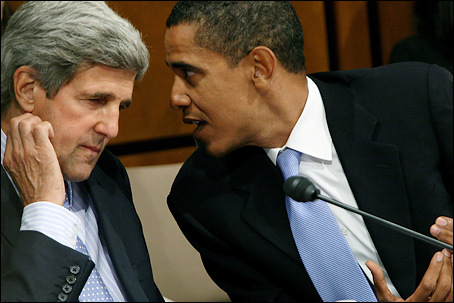President Obama has nominated Massachusetts Senator John Kerry to be his next Secretary of State, replacing Hillary Clinton with an equally establishment, equally interventionist voice in American politics.
 Kerry currently serves as the chairman of the Senate Foreign Relations Committee, and his past record as a soldier in Vietnam and US diplomat in several capacities has earned him a reputation for expertise in foreign policy.
Kerry currently serves as the chairman of the Senate Foreign Relations Committee, and his past record as a soldier in Vietnam and US diplomat in several capacities has earned him a reputation for expertise in foreign policy.
But his political career has largely been defined by taking positions that are politically expedient at the time, as was made famous when he challenged President Bush for the White House in 2004; Republicans attacked him for being for the war in Iraq, before it was popular for Democrats to be against it.
Kerry still takes this approach. Back in May, when leaders in Congress began pushing for a US military intervention in Syria to unseat the Assad regime in its “civil war” with rebel forces, Kerry himself advocated imposing a no-fly zone in Syria and directly arming the rebels.
Since then, as it became clear the Obama administration was not going to support a no-fly zone, Kerry’s advocacy for intervention has quieted.
In announcing Kerry’s nomination, President Obama spoke of Kerry’s “extraordinarily distinguished Senate career, and as chairman of the Foreign Relations Committee,” his “central role in every major foreign policy debate for nearly 30 years.”
That, however, is not a favorable credential, given the course of US foreign policy since the Reagan administration.
The Senate Foreign Relations Committee, under Kerry’s chairmanship, released a report in June on US policy in the Middle East. Much of the study describes how Washington will maintain key military bases and troop presence throughout the entire region and how to overcome challenges to maintaining such dominance, which is vital because the region is “home to more than half of the world’s oil reserves and over a third of its natural gas.”
The report acknowledged that US military presence in the region as well as US support for brutal dictatorships has generated widespread hatred and blowback. This ugly side of US foreign policy shouldn’t be stopped, argued the report, but the US should maintain the imperial dominance over the region, while somehow avoiding the messy “backlash” and embarrassing support for “human rights abuses.”
The “backlash” the Committee worried about is hard to avoid. And it argued for continuing the veritable garrisoning of Iran’s surroundings, which the report said “provide[s] a counterbalance,” despite it making the Islamic Republic more guarded, which amplifies tensions and increases the likelihood of unnecessary conflict.


